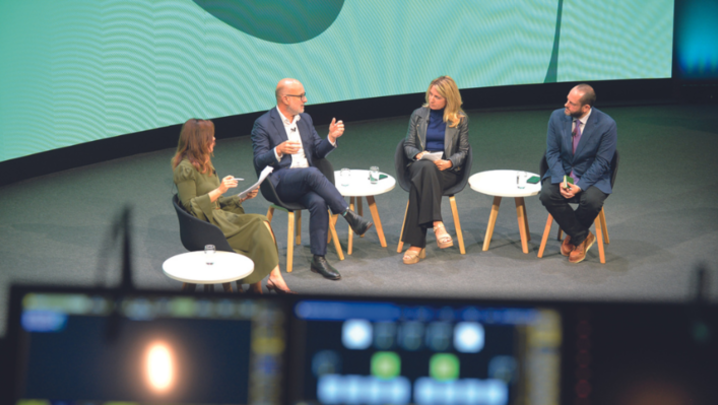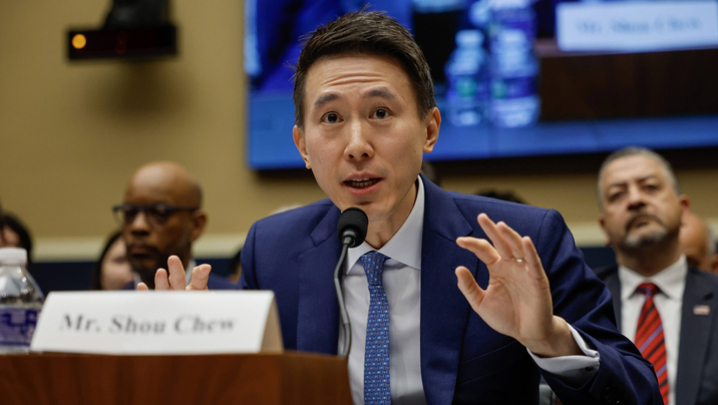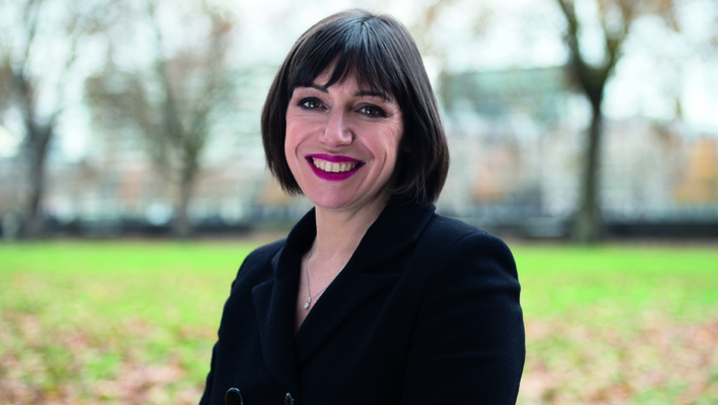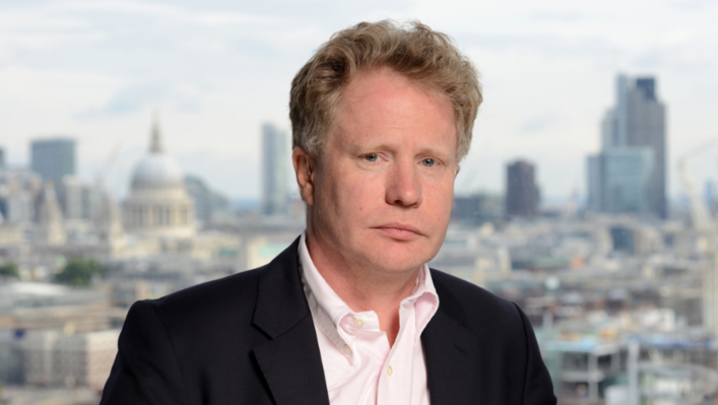Julie Etchingham, twice named RTS Presenter of the Year, reveals the toughest politicians to interview.
Newsreaders are necessarily calm and rarely ruffled. Until, in the case of ITV News heavyweight Julie Etchingham, they get to interview their teen hero, Simon Le Bon of Duran Duran. “I was so flummoxed – I’d been such a teenage fan that I couldn’t actually get a sentence out. I made a complete fool of myself,” she admitted.
Etchingham, who was talking at an RTS Devon and Cornwall event in November, went on to identify general election leaders’ debates as her most terrifying on-screen experiences. The worst was her first, the unprecedented seven-way debate in 2015.
“I had countless sleepless nights trying to prep that, because you had to be across all the different manifestos [and] political characters,” she said. “It was, quite frankly, utterly, utterly terrifying. I’ve done quite a lot of them since and they never lose the terror factor.”
Etchingham fronts ITV’s News at Ten and current affairs show Tonight. She picked Theresa May and Gordon Brown as the toughest prime ministers to interview.
Recalling the moment when May said the naughtiest thing she had ever done was to “run through fields of wheat” as a child, a revelation that led to a great deal of mockery, Etchingham said: “I had no idea that it would take off in the way it did. She was challenging to interview because she’s so private…. She’s an introvert in a world of extroverts at Westminster.
“It was very difficult to interview Gordon Brown because he could just reel off statistics and facts,” she recalled. “You could have had a conversation with him five minutes before that [and he] would have been very chatty, very personable… but literally as soon as the camera came on, this… juggernaut of stats would come at you.”
Etchingham was a news junkie from an early age. “I kept a diary from the age of six and, the older I got, the more news cuttings I was keeping [from her hometown newspaper, the Leicester Mercury],” she recalled. At 13, her mother suggested she might make a journalist, which Etchingham described as a “light-bulb moment”.
She did work experience at the Leicester Mercury, BBC Radio Leicester and a local independent radio station around the time of her GCSEs. Then, in her sixth form, Etchingham worked on a BBC Radio Leicester Sunday-morning show, where, “bit by bit, they let me loose on the equipment. I learnt how to go out and do an interview and edit, which involved bits of tape, razor blades and Sellotape – it was properly back in the ark.”
Etchingham studied English at Cambridge, winning a place on the BBC’s regional journalist training scheme, before starting a four-year stint presenting Newsround in 1994. “It was such an honour to do that job because you had the responsibility of unpacking and explaining an increasingly complex world to a young audience,” she said. “Back then, it was things like the Northern Ireland peace process, stuff that most adults find challenging to keep up with.”
The young presenter went on to work in newsrooms at the BBC, Sky and ITV, so is now well placed to weigh up their strengths: “The Beeb has an enormous breadth and depth, purely because of the size of the organisation, but that can also be cumbersome, because sometimes it takes longer to take decisions when covering stories.
“One of the things I’ve come to appreciate over the years, certainly at Sky News and ITV News, is that a smaller team can be more fleet of foot.
“[At] ITV News, we have a very different approach in terms of presentation styles. This isn’t to say that the BBC isn’t warm and friendly, because it is… but ITV News very deliberately [has] a more relaxed, conversational, warmer style than our oppos at the BBC.”
She added: “The key to ITV News and ITN has always been eyewitness [reporting].” The storming of the US Capitol building in Washington DC by supporters of President Trump offered a recent example. “Robert Moore and his team have been rightly showered with awards for their coverage – he was right in there, with the protesters as they stormed the Capitol… it was quintessential ITN/ITV News eyewitness reporting.”
The past couple of years have been tough for news journalists and Etchingham warned: “You do need to think quite carefully about the impact on your mental health of how you manage this job. When I started out, there was no such thing as social media… you could step back from the job a little.
“We’ve all struggled with it in the past 18 months in particular, because we’ve just been steeped in this [coronavirus] crisis, and that came hot on the heels of Brexit and the 2019 general election.… Burnout… is a real danger. I’ve seen it, and I’ve been pretty close to it myself.”
Newsrooms have got better at looking after their staff, but Etchingham said: “You can’t avoid the intensity [of the job]. There are sacrifices that you make and, actually, more important to mention, there are a lot of sacrifices that your family makes.”
Etchingham was working for Sky News when the Boxing Day tsunami hit in 2004: “My son was just coming up to two and… I got told to get to the airport – I was off to Thailand. I literally handed my husband the baby, not knowing when I was coming back. You need your partners, friends and families to get through this job sometimes.”
Report by Matthew Bell. Julie Etchingham was in conversation with Mike Baker, a senior lecturer at Plymouth Marjon University. The RTS Devon and Cornwall event was held on 17 November.
Pictured: Julie Etchingham (Credit: ITV/David Cotter)
Question & answer
Q How do you break into broadcast journalism?
A Julie Etchingham: Everyone needs meaningful work experience – you’ve got to push to [get into] a professional journalistic outfit that will give you an insight, support and, hopefully, a leg up into the industry. You’ve got so many ways to try things out now: you can blog; you can host a podcast; you can write.… And, crucially, start making contacts.
Q Should young journalists push themselves?
A You need to be courageous and not be afraid of failure, because you will get pushbacks…. Unless you push yourself out of your comfort zone, how will you ever know what your potential is?
Q Is there a set path into broadcast journalism?
A There are so many different routes…. You want to draw on people’s expertise, stories, places, countries or cultures – that’s why it’s so vital that we have diversity in newsrooms, otherwise we are not holding up a mirror to society.
Q Do you have any interviewing tips?
A Know your audience, do your prep, and then have the confidence to be fleet of foot. The crucial thing is listen, listen, listen, in case they lob something in that you have to pick up and react to.
Q How do you recover from mistakes?
A I’ve made plenty.… If you’ve made a factual error, clearly your first responsibility is to correct it as fast as humanly possible.… People do understand that mistakes happen in live broadcasting, [although] social media is so unbelievably unforgiving.
Q Is it now easier for women to get into broadcast journalism?
A Things have changed enormously for women in news in the 30 years that I’ve worked in it.
It’s not perfect by any means, particularly the treatment of women on social media… but, in terms of boots on the ground, there are a lot more of us and a lot more in management.
Q How do you remain politically neutral?
A Politics has been feverish, it’s been polarised and divisive…. We’ve all got our views, but you have to leave them at the door.







